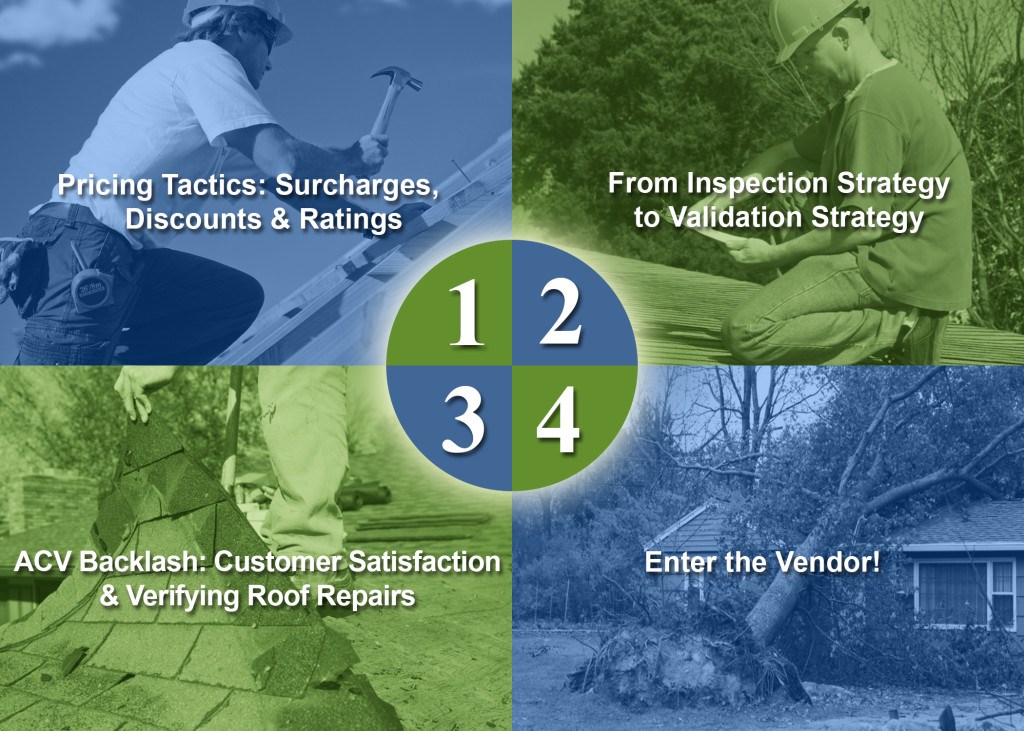In part 1, we described the current trends in solving the roof risk problem. Part 2, covered today, lists the trends ahead facing insurance and reinsurance carriers alike in their journey to tackle the roof risk problem. BuildFax interviewed carriers (from the C-Suite to actuaries, to underwriter and adjusters), inspectors, agents, and vendors to identify the current trends to solving the roof problem, which we detail in a white paper and in this two-part series for Claims Journal.
1) Pricing Tactics: Surcharges, Discounts, and Rating.It is becoming increasingly common for carriers to use ratings based on roof characteristics. However, given the difficulties of finding good roof characteristic data and the regulatory hurdles in getting rate plans approved, surcharges (based upon materials) and discounts (state-sponsored, such as wind mitigation, or age-based) are more common pricing tactics at the moment. Expect to see a shift towards rating on roof characteristics. Leading carriers have been running loss analysis against the best data they have found to show that certain characteristics, like roof age and roof material, can be used reliably to price the roof risk, and are planning to expand their roof rating efforts.
2) From Inspection Strategy to Validation Strategy. Product eligibility and pricing variables are only as good as the data points going into them. With granularity of product and pricing, data validation becomes a bigger issue.Therefore, a carrier’s inspection strategy must evolve to a validation strategy where, depending upon the data point, location of the property, coverage details, and other factors, either a specific type of inspection is ordered or a particular data source is consulted (aerial images or building permits). Additionally, some carriers see a role for adjusters in this data validation strategy, providing data from the field.

3) ACV Backlash – Customer Satisfaction and Verifying Roof Repairs. There is concern that customers will not fully understand that they may have to pay significant amounts of money out of pocket to properly repair their roof after damage (a customer will need $10,000 for a new roof, but will only get $4,000 from their carrier after depreciation and deductible). If the cost of a repaired roof significantly exceeded the loss payment, customers might “take the money and run” and leave the roof unrepaired—or partially repaired by an unlicensed contractor (“Cousin Bob”). This problem is made worse by the storm chasers with even less incentive to do any significant repairs on the roof with a partial payment. There is a potential for ACV coverage on roofs to open carriers up to significant future risk by insuring roofs that are damaged, where future events may compromise the roof and significantly damage the rest of the structure and the contents.
4) Enter the Vendor! Vendor products helping carriers tackle the roof age problem will continue to hit the market as carriers progress towards rating systems based on roof characteristics, data validation becomes more intertwined with the inspection strategy, and potential ACV backlash becomes a growing concern.
- BuildFax provides accurate, on-demand roof age and roof repair follow-up confirmation.
- EagleView provides roof measurement reports and associated imagery.
- ITEL provides roof material matching services so that it is easier to repair instead of replace.
- LexisNexis provides marketing solutions that make it easy to target homes with new roofs.
- MSB provides roof age, material, and shape information through a waterfall pre-fill.
- Nexxus SG is a vetted contractor network which includes licensed and insured roofers.
- RiskMeter provides roof characteristics for pre-fill to carriers of all sizes.
- Symbility provides a cloud-based claims platform handling all aspects of roof claims workflow.
 By Holly Tachovsky, CEO and Joe Emison, chief technology officer. BuildFax collects and organizes construction records on millions of U.S. properties.
By Holly Tachovsky, CEO and Joe Emison, chief technology officer. BuildFax collects and organizes construction records on millions of U.S. properties.
Emison oversees BuildFax’ cloud architecture and frequently speaks on cloud architecture, scaling in the cloud and cutting costs in the cloud.
Was this article valuable?
Here are more articles you may enjoy.

 Tesla Sued Over Crash That Trapped, Killed Massachusetts Driver
Tesla Sued Over Crash That Trapped, Killed Massachusetts Driver  UBS Top Executives to Appear at Senate Hearing on Credit Suisse Nazi Accounts
UBS Top Executives to Appear at Senate Hearing on Credit Suisse Nazi Accounts  Portugal Rolls Out $2.9 Billion Aid as Deadly Flooding Spreads
Portugal Rolls Out $2.9 Billion Aid as Deadly Flooding Spreads  Elon Musk Alone Can’t Explain Tesla’s Owner Exodus
Elon Musk Alone Can’t Explain Tesla’s Owner Exodus 